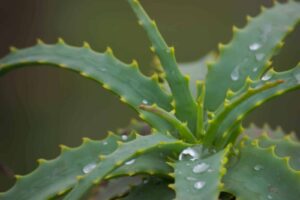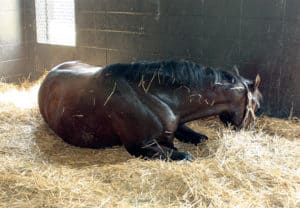
Aloe Vera for Equine Ulcers?
A veterinarian addresses whether oral aloe vera could help horses with gastric ulcers and offers evidence-based alternatives.

A veterinarian addresses whether oral aloe vera could help horses with gastric ulcers and offers evidence-based alternatives.

A veterinarian addresses whether oral aloe vera could help horses with gastric ulcers and offers evidence-based alternatives.

Post-foaling colic is a significant threat for mares. Dr. Anthony Blikslager describes what to look for and how to respond if your mare colics following foaling.

Dr. Anthony Blikslager reviews what to look for if you think your horse is colicking.

Dr. Anthony Blikslager offers insight to vets on recognizing horses in pain and covers drug therapy options.

What can happen if a horse overdoses on Previcox? A veterinarian shares his insight.

My horses got into a pasture yesterday where deer corn had been spread, and they ate some of it. Then, last night, they didn’t want to eat anything. What is the deer corn going to do to them?
What might cause my mare to regurgitate her grain?
Are there any products available to give on a daily basis to horses that develop gas easily?
My gelding has been diagnosed with a hernia between the omentum and the inguinal ring. He hasn’t had signs of

All about equine colic, from when to call the vet to how well horses recover from surgery.

Dr. Anthony Blikslager of the North Carolina State University talks about colic in horses. (7:39)
Generally, the population of horses that develop severe colic includes the ones that don’t respond to the veterinarian’s initial treatment. Almost all severe colics start as mild colics that are simply left too long.
The age-old disease of colic can best by managed be returning the horse–as much as possible–to its natural environment. This means
Colic continues to be a serious health concern for horse owners and the equine industry. Studies indicate that approximately 10% of the horse population will suffer an episode of colic each year and that approximately 0.7% will die from
Recent studies have shown that horses are far more stoic than we had imagined. On the scale of pain tolerance, they are much higher than people. For example, the thrashing colicky horse often needs surgery, and after surgery, pain is very difficult
Stay on top of the most recent Horse Health news with
© 2022 Copyright Statement dolor sit amet, consetetur sadipscing User Terms, sed diam nonumy eirmod tempor invidunt ut labore et dolore magna aliquyam erat, sed diam voluptua. At vero eos et accusam et justo duo dolores et ea rebum. Stet clita kasd gubergren, no sea takimata sanctus est Lorem ipsum dolor sit amet.